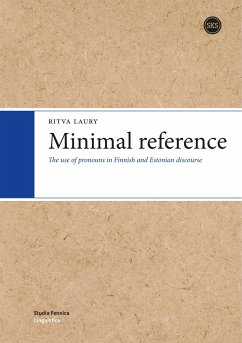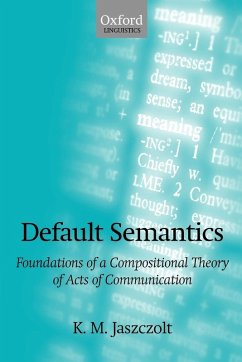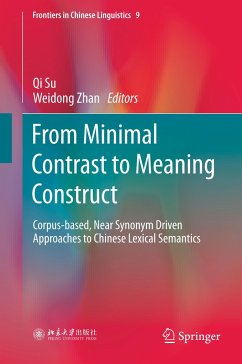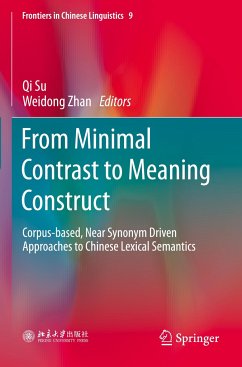
Minimal Semantics

PAYBACK Punkte
73 °P sammeln!
Minimal Semantics asks what a theory of literal linguistic meaning is for - if you were to be given a working theory of meaning for a language right now, what would you be able to do with it? Emma Borg argues for a minimal answer to this question, thereby defending so-called 'formal semantics' from some serious recent challenges. She argues that opponents confuse understanding of language with related skills, like understanding communication.
Finally, she explores the implications of this stance for claims about psychological structure. Clear and accessible without sacrificing rigour, Borg's book will be illuminating for all philosophers of language and many working in related fields.
Finally, she explores the implications of this stance for claims about psychological structure. Clear and accessible without sacrificing rigour, Borg's book will be illuminating for all philosophers of language and many working in related fields.
Minimal Semantics asks what a theory of literal linguistic meaning is for - if you were to be given a working theory of meaning for a language right now, what would you be able to do with it? Emma Borg sets out to defend a formal approach to semantic theorising from a relatively new type of opponent - advocates of what she call 'dual pragmatics'. According to dual pragmatists, rich pragmatic processes play two distinct roles in linguistic
comprehension: as well as operating in a post-semantic capacity to determine the implicatures of an utterance, they also operate prior to the determination of truth-conditional content for a sentence. That is to say, they have an integral role to play within what is usually thought of as the semantic realm.
Borg believes dual pragmatic accounts constitute the strongest contemporary challenge to standard formal approaches to semantics since they challenge the formal theorist to show not merely that there is some role for formal processes on route to determination of semantic content, but that such processes are sufficient for determining content. Minimal Semantics provides a detailed examination of this school of thought, introducing readers who are unfamiliar with the topic to key ideas
like relevance theory and contextualism, and looking in detail at where these accounts diverge from the formal approach.
Borg's defence of formal semantics has two main parts: first, she argues that the formal approach is most naturally compatible with an important and well-grounded psychological theory, namely the Fodorian modular picture of the mind. Then she argues that the main arguments adduced by dual pragmatists against formal semantics - concerning apparent contextual intrusions into semantic content - can in fact be countered by a formal theory. The defence holds, however, only if we are sensitive to the
proper conditions of success for a semantic theory. Specifically, we should reject a range of onerous constraints on semantic theorizing (e.g., that it answer epistemic or metaphysical questions, or that it explain our communicative skills) and instead adopt a quite minimal picture of semantics.
comprehension: as well as operating in a post-semantic capacity to determine the implicatures of an utterance, they also operate prior to the determination of truth-conditional content for a sentence. That is to say, they have an integral role to play within what is usually thought of as the semantic realm.
Borg believes dual pragmatic accounts constitute the strongest contemporary challenge to standard formal approaches to semantics since they challenge the formal theorist to show not merely that there is some role for formal processes on route to determination of semantic content, but that such processes are sufficient for determining content. Minimal Semantics provides a detailed examination of this school of thought, introducing readers who are unfamiliar with the topic to key ideas
like relevance theory and contextualism, and looking in detail at where these accounts diverge from the formal approach.
Borg's defence of formal semantics has two main parts: first, she argues that the formal approach is most naturally compatible with an important and well-grounded psychological theory, namely the Fodorian modular picture of the mind. Then she argues that the main arguments adduced by dual pragmatists against formal semantics - concerning apparent contextual intrusions into semantic content - can in fact be countered by a formal theory. The defence holds, however, only if we are sensitive to the
proper conditions of success for a semantic theory. Specifically, we should reject a range of onerous constraints on semantic theorizing (e.g., that it answer epistemic or metaphysical questions, or that it explain our communicative skills) and instead adopt a quite minimal picture of semantics.












